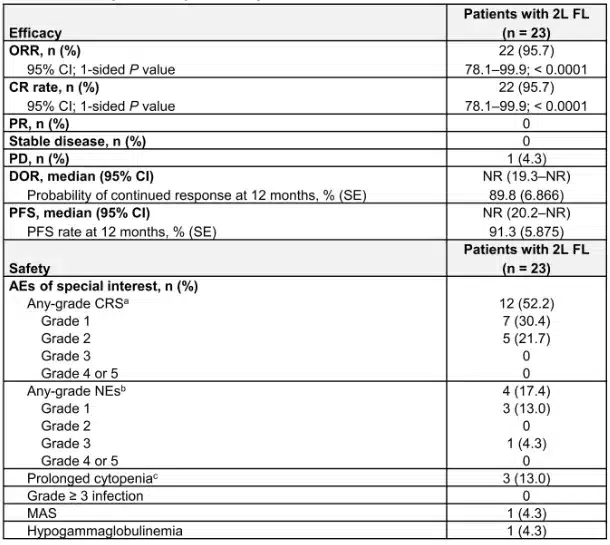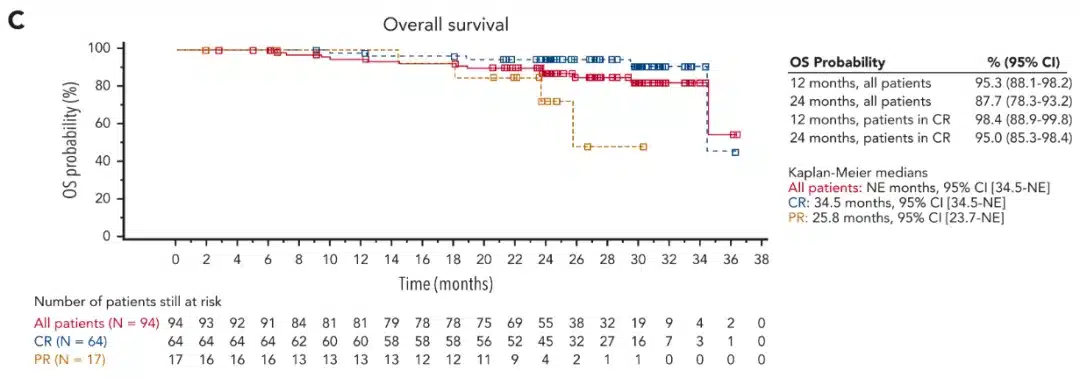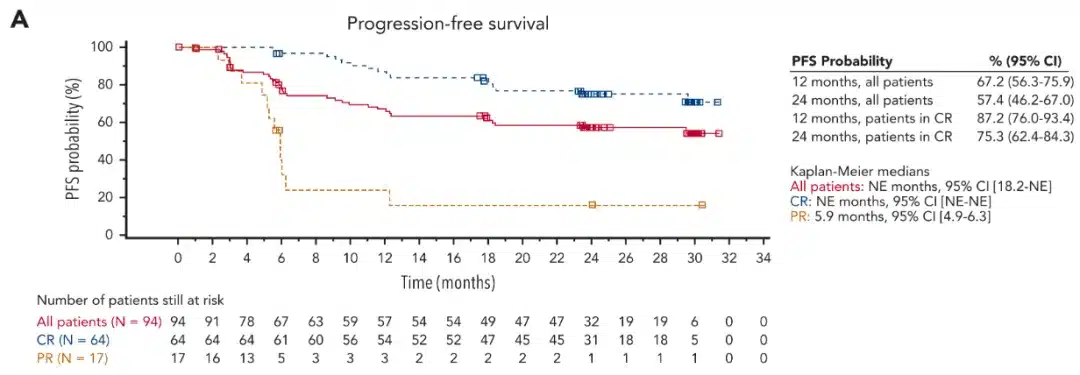New Hope for Patients with CAR-T Cell Follicular Lymphoma
New Hope for Patients with CAR-T Cell Follicular Lymphoma
Follicular lymphoma is a lymphoproliferative disorder originating from B cells. It is a type of non-Hodgkin’s lymphoma, and the B-cell lymphoma 2 (BCL2) gene is overexpressed in most patients. Patients with this cancer may experience painless lymph node enlargement, elevated serum lactate dehydrogenase, weight loss, night sweats, and fever. Early-stage follicular lymphoma patients receive radiation therapy[1]. Advanced cancer patients are treated with the anti-CD20 (Cluster of Differentiation 20) monoclonal antibody rituximab and chemotherapy drugs (e.g., bendamustine, cyclophosphamide, vincristine, and doxorubicin). Follicular lymphoma patients have a high risk of relapse and a poor prognosis.
On May 15, 2024, the U.S. Food and Drug Administration (FDA) granted accelerated approval for an immunotherapy treatment for follicular lymphoma[2]. Lisocabtagene maraleucel is a chimeric antigen receptor (CAR) T-cell therapy targeting CD19 (Cluster of Differentiation 19), an antigen present on B cells. CAR T-cell therapy is a novel immunotherapy for treating cancer. This treatment involves genetically modifying a patient’s T cells to recognize cancer cells. After genetic modification, the T cells express a CAR, which is a special receptor that binds to antigens. These cells are expanded in the laboratory and then infused into the patient.
Lisocabtagene maraleucel, developed by Juno Therapeutics, is administered as a one-time treatment to patients. The FDA had previously approved this therapy for the treatment of large B-cell lymphoma and small lymphocytic lymphoma or chronic lymphocytic leukemia. Lisocabtagene maraleucel can be used in patients who have received at least two prior therapies (including an alkylating agent and an anti-CD20 antibody). The recommended dose of this treatment for patients is 90 to 110 x 106 CAR-positive T cells. The ratio of CD8 and CD4 components in this treatment is 1:1. The CAR in this therapy has a CD3 zeta signaling domain fused with a 4-1BB costimulatory domain, leading to CAR T-cell proliferation. Other components of this CAR include an IgG4 hinge, a single-chain variable fragment (scFv), and a CD28 transmembrane domain.
The therapy received approval based on results from the phase 2 TRANSCEND-FL clinical trial. Preliminary analysis results from this clinical trial were presented at the 2023 International Conference on Malignant Lymphoma[3]. According to this preliminary analysis, the overall response rate was 97% among 101 evaluable follicular lymphoma patients who received CAR T-cell therapy as third-line or later (3L+) treatment[4]. A complete response was observed in 94.1% of patients. At a median follow-up of 16.6 months, the median duration of response had not been reached. At one year, 81.9% of patients continued to respond to the treatment. At a median follow-up of 17.5 months, the median progression-free survival had not been reached. The one-year progression-free survival rate was 80.7%. In this clinical trial, 130 patients received CAR T-cell therapy as second-line or later (2L+) treatment. Among these patients, 15% and 58% experienced neurological events and cytokine release syndrome, respectively.
Additional data from the clinical trial were presented at the 2023 American Society of Hematology (ASH) Annual Meeting and Exposition. Among 23 evaluable second-line follicular lymphoma patients, the overall response rate was 95.7%[5]. At a median follow-up of 16.8 months, the median duration of response had not been reached. At one year, 89.8% of patients continued to respond to the treatment. At a median follow-up of 17.8 months, the median progression-free survival had not been reached. The one-year progression-free survival rate was 91.3%[6]. Cytokine release syndrome and neurological events occurred in 52.2% and 17.4% of patients, respectively.

Image 1: Efficacy and safety of lisocabtagene maraleucel for patients [Source: Reference 5]
Previously, axicabtagene ciloleucel (Yescarta) and tisagenlecleucel (Kymriah) had received accelerated approval from the FDA for the treatment of follicular lymphoma. Axicabtagene ciloleucel is a CD19-targeted CAR T-cell therapy developed by Kite Pharma. In the phase 2 ZUMA-5 clinical trial, the objective response rate was 91% among 81 evaluable follicular lymphoma patients[7]. A complete response was observed in 60% of patients. The median duration of response had not been reached. At 12 months, 76.2% of patients remained in response. In this clinical trial, 127 follicular lymphoma patients and 31 marginal zone lymphoma patients were enrolled and received axicabtagene ciloleucel[8]. At a 3-year follow-up, the median duration of response and median progression-free survival for follicular lymphoma patients were 38.6 months and 40.2 months, respectively.
Tisagenlecleucel is a CD19-targeted CAR T-cell therapy developed by Novartis. In the preliminary analysis of the phase 2 ELARA clinical trial, the overall response rate was 86% among 90 evaluable follicular lymphoma patients. A complete response was observed in 68% of patients. The median duration of response had not been reached. At 9 months, 75% of responding patients remained in response[9]. Safety was evaluated in 97 patients in this clinical trial[10]. Cytokine release syndrome and neurological events occurred in 53% and 43% of patients, respectively. At a median follow-up of 29 months, the overall response rate was 86.2%[11]. The 2-year overall survival and progression-free survival rates were 87.7% and 57.4%, respectively.

Image 2: Overall survival of patients treated with tisagenlecleucel [Source: Reference 11]

Image 3: Progression-free survival of patients treated with tisagenlecleucel [Source: Reference 11]
In summary, lisocabtagene maraleucel has received accelerated approval from the FDA for the treatment of relapsed or refractory follicular lymphoma. Follicular lymphoma patients receiving this treatment demonstrated durable responses in the phase 2 clinical trial.
References:
[1] Jacobsen, E. (2022). Follicular lymphoma: 2023 update on diagnosis and management. American Journal of Hematology, 97(12), 1638-1651.
[2] FDA (2024, 15 May). FDA grants accelerated approval to lisocabtagene maraleucel for follicular lymphoma. https://www.fda.gov/drugs/resources-information-approved-drugs/fda-grants-accelerated-approval-lisocabtagene-maraleucel-follicular-lymphoma#:~:text=On%20May%2015%2C%202024%2C%20the,prior%20lines%20of%20systemic%20therapy.
[3] Bristol Myers Squibb (2024, 15 May). Bristol Myers Squibb’s CAR T Cell Therapy Breyanzi Approved by the U.S. Food and Drug Administration for Relapsed or Refractory Follicular Lymphoma. https://news.bms.com/news/corporate-financial/2024/Bristol-Myers-Squibbs-CAR-T-Cell-Therapy-Breyanzi-Approved-by-the-U.S.-Food-and-Drug-Administration-for-Relapsed-or-Refractory-Follicular-Lymphoma/default.aspx
[4] Nastoupil, L. J., Dahiya, S., Palomba, M. L., Garcia-Sancho, A. M., Ortega, J. L. R., Kuruvilla, J., … & Morschhauser, F. (2023). IBCL-098 TRANSCEND FL: phase II study results of lisocabtagene maraleucel (Liso-Cel) in patients with R/R follicular lymphoma (FL). Clinical Lymphoma Myeloma and Leukemia, 23, S447-S448.
[5] Morschhauser, F., et al., (2023, 10 December). 602 TRANSCEND FL: Phase 2 Study Primary Analysis of Lisocabtagene Maraleucel as Second-Line Therapy in Patients with High-Risk Relapsed or Refractory Follicular Lymphoma. https://ash.confex.com/ash/2023/webprogram/Paper179474.html
[6] Bristol Myers Squibb (2023, 10 December). Bristol Myers Squibb Presents New Data at ASH 2023 Demonstrating Clinical Benefit Across B-cell Malignancies with Breyanzi as a Second-Line Treatment in High-Risk Follicular Lymphoma and in Relapsed or Refractory Chronic Lymphocytic Leukemia. https://news.bms.com/news/corporate-financial/2023/Bristol-Myers-Squibb-Presents-New-Data-at-ASH-2023-Demonstrating-Clinical-Benefit-Across-B-cell-Malignancies-with-Breyanzi-as-a-Second-Line-Treatment-in-High-Risk-Follicular-Lymphoma-and-in-Relapsed-or-Refractory-Chronic-Lymphocytic-Leukemia/default.aspx
[7] FDA (2021, 8 March). FDA grants accelerated approval to axicabtagene ciloleucel for relapsed or refractory follicular lymphoma. https://www.fda.gov/drugs/resources-information-approved-drugs/fda-grants-accelerated-approval-axicabtagene-ciloleucel-relapsed-or-refractory-follicular-lymphoma#:~:text=On%20March%205%2C%202021%2C%20the,more%20lines%20of%20systemic%20therapy.
[8] Neelapu, S. S., Chavez, J., Sehgal, A. R., Epperla, N., Ulrickson, M., Bachy, E., … & Jacobson, C. A. (2022). 3-year follow-up analysis of ZUMA-5: a phase 2 study of axicabtagene ciloleucel (Axi-Cel) in patients with relapsed/refractory (R/R) indolent non-Hodgkin lymphoma (iNHL). Blood, 140(Supplement 1), 10380-10383.
[9] FDA (2022, 31 May). FDA approves tisagenlecleucel for relapsed or refractory follicular lymphoma. https://www.fda.gov/drugs/resources-information-approved-drugs/fda-approves-tisagenlecleucel-relapsed-or-refractory-follicular-lymphoma
[10] Novartis (2022, 28 May). FDA approves Novartis Kymriah® CAR-T cell therapy for adult patients with relapsed or refractory follicular lymphoma. https://www.novartis.com/news/media-releases/fda-approves-novartis-kymriah-car-t-cell-therapy-adult-patients-relapsed-or-refractory-follicular-lymphoma
[11] Dreyling, M., Fowler, N. H., Dickinson, M., Martinez-Lopez, J., Kolstad, A., Butler, J., … & Schuster, S. J. (2024). Durable response after tisagenlecleucel in adults with relapsed/refractory follicular lymphoma: ELARA trial update. Blood, 143(17), 1713-1725.
Content Source:肿瘤药闻
